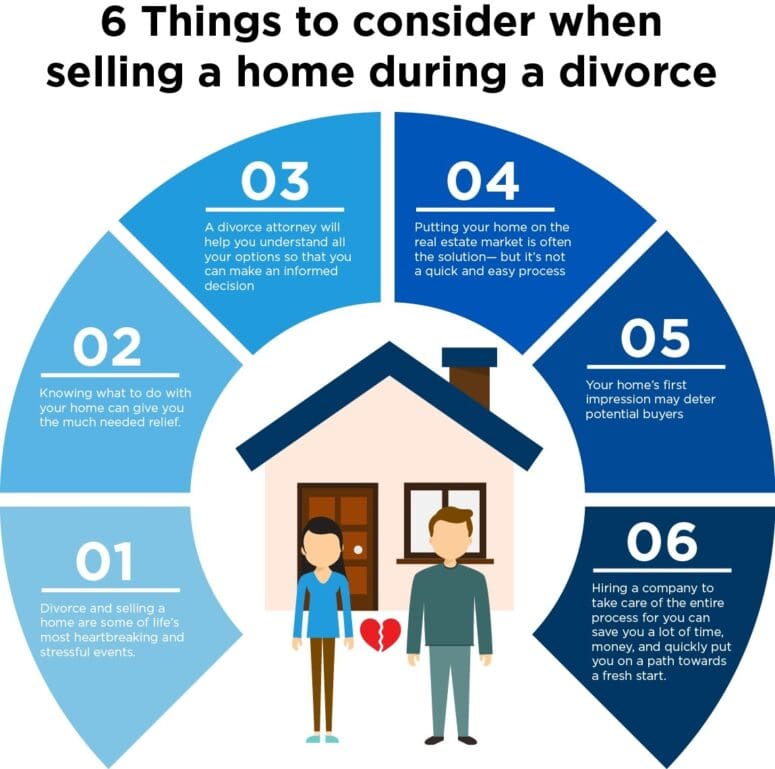5 Tips to Help You Survive Selling a Home During a Divorce
- Published on
-
 Christine Bartsch Contributing AuthorClose
Christine Bartsch Contributing AuthorClose Christine Bartsch Contributing Author
Christine Bartsch Contributing AuthorFormer art and design instructor Christine Bartsch holds an MFA in creative writing from Spalding University. Launching her writing career in 2007, Christine has crafted interior design content for companies including USA Today and Houzz.
The loneliness of divorce leaves many feeling like they’re stranded on a deserted island. Add selling off the family home into the equation, and you’re adrift on a turbulent sea in a tiny row boat without paddles.
As isolating as divorce seems, you’re not alone.
Statistics from 2016 show that there were 827,261 divorces in the U.S.—that’s a rate of 3.2 per every 1,000 people. And every one of those separating couples have experts to guide them.

They have attorneys to help them through the lengthy, emotionally draining divorce proceedings. They also have access to organizations willing to assist them in maneuvering through the divorce process, as well as providing divorce law resources for every state. Plus, their local communities have any number of support groups to get them through the emotional upheaval.
And if they sell their home as part of the process, they’ll enlist the assistance of a top-notch real estate agent with experience handling divorce sales, too.
But no matter how much outside help you get, it’s your attitude and approach that determines whether the home sale will be rocky or smooth sailing. If you come into the home sale ready to do battle, you’ll only drag out the process and wind up costing yourself money.
Luckily, with these tips from real estate professionals who have learned over years of experience how to be a guiding light, you can navigate the uncharted waters of selling a home during a divorce successfully.

1. Remember: Selling Your Home in a Divorce Is Business
The home sale process is complex and requires dozens of decisions that both parties will need to agree on. Couples who get personal, instead of staying professional, wind up making poor decisions out of spite.
Top agent Annpauline Creamer—who ranks #8 out of 665 agents in the Mahopac, New York area—explains:
“Spouses need to handle the sale like a business transaction. As an agent, I represent both spouses, not just one—and I’ve had some divorce situations where they couldn’t agree on the money. In difficult situations, I have to get the attorneys involved because the clients can’t agree.”
If you interfere with the home sale in an attempt to hurt your spouse, you’ll just wind up hurting yourself financially.
For your own mental health and financial well-being, you need to set aside past unpleasantness with your soon-to-be-ex and focus on the fact that selling the home is just part of the business of getting divorced.
2. Let Your Agent Be the Go-Between
If you’re getting divorced, your communication with your spouse probably isn’t that great. And if you’re like most sparing couples, you fight about money.
Since the home sale is a financial transaction, it’s primed with the potential to become another big financial fight. It’s not uncommon for sparing spouses to do battle over setting the list price or accepting an offer.
The home sale decisions aren’t all financial, either. Divorcing couples have also been known to battle over the little decisions, like improving curb appeal or repainting the interior.
While going to war over home sale decisions large and small may give you an outlet to express your anger or need for revenge, all you’re really doing is dragging out the process—and delaying the finalization of the divorce.
Instead of getting into verbal sparring matches with your spouse, you’ll be doing yourself a favor by routing all communications with your spouse through your agent.
3. Hire an Agent You Both Can Trust
There are two sides to every divorce. An experienced agent knows how to impartially listen to both sides and make recommendations that best benefit both parties.
Before this can happen, you first need to agree on which trustworthy agent to hire.
With so much upheaval going on with the divorce and the home sale, it may make sense to simply stick with the agent who sold you both the home. But this is only a good idea if both spouses agree that your former agent can remain impartial.
If not, you’ll need to find a new one by asking your attorney for recommendations and using online resources that rank the top agents in your area. Interview your top picks by asking them questions about their experience with divorcing clients and note which ones put you the most at ease.
To avoid fighting over the real estate agent selection, it’s better for both spouses to compile a short list of top candidates and let your divorce attorney pick the one closest to the top on both lists.
4. You Need to Keep Paying the Mortgage Until the Home Sells
Filing for divorce does not end your responsibility to your mortgage lender. As long as the home and the loan are in the name of both spouses, both are financially responsible for the debt—even if one is no longer living in the home.
If that mortgage isn’t paid during the time it takes for the home to sell, the delinquency will damage the credit history of both spouses.
It’s true that there are ways to remove yourself or your spouse from the title to the house, such as with a quitclaim deed or a court order. But doing so may require surrendering your right to any proceeds from the home sale.
Plus, removing one spouse from the title does not remove that spouse’s name from the mortgage. The only way to remove a party from the mortgage is by refinancing. However, this is rarely a good idea if you’re already in the process of selling.
Your best bet is to ask your attorney or a divorce mediator to hammer out an agreement as to how the mortgage and other bills will get paid during the divorce proceedings.
After all, your home may be the biggest asset you shared as a couple, but it isn’t the only one. From cars to couches to credit card debt, all physical property, financial assets, and debts from the marriage must be assessed and divided by the court.
In fact, figuring out who should pay the mortgage and other bills in the interim may even require going to court to determine which spouse has the legal responsibility to pay. If you live in a state with community property laws, all debt owed and property owned equally by both spouses is divided equally.
But if you live in a state with equitable distributions laws, the property will be divided fairly, but not necessarily equally. So the court may take mortgage payments into account and decide that the spouse making those payments is entitled to more of the proceeds from the sale.
5. One Spouse Should Move Out Before Listing the Home
When a couple files for divorce, it only makes sense for one spouse to move out of the house, but this doesn’t always happen. Why? Because when you move out, it can feel like you’re letting go of your ownership of the house.
But this simply isn’t true.
As long as your name is on the mortgage and title, or the home is legally recognized as an asset of the marriage, your ownership is established. This is true even if your spouse gets a court order granting exclusive rights for the use of the property during the divorce.
As long as you’ve hired a real estate agent you can trust, you don’t need to worry about being left out of decisions that pertain to the sale of the home.
Creamer explains, “As far as offers, we communicate with both parties. But generally, one spouse should move out because that makes it easier to show the home. And I would recommend that if it’s at all possible. I had one sale where both of spouses refused to leave the house. It was a split-level home and the husband had moved into the downstairs of the house and changed the locks. So we had to have two keys to do the showings.”
With only one spouse living in the house, showings are easier to set up—which means you’ll be able to show it more often. The more you show the home, the more likely you are to get multiple offers in the shortest time span.
And the sooner your home is sold, the sooner you can move forward with finalizing your divorce.
When Selling Your Home During a Divorce, Leave Emotion Out of It
Divorce is difficult. Selling a home during a divorce is twice as difficult.
All of the anger, bitterness, and resentment in a broken marriage can result in one or both spouses derailing the home sale. But with these tips you can send those emotions packing into the past and treat the process like a cold hard business transaction.
If you can manage that, you’ll be free to coast into your future with the proceeds from a successful home sale in your pocket.
Article Image Source: (Matthew Henry/ Burst)
